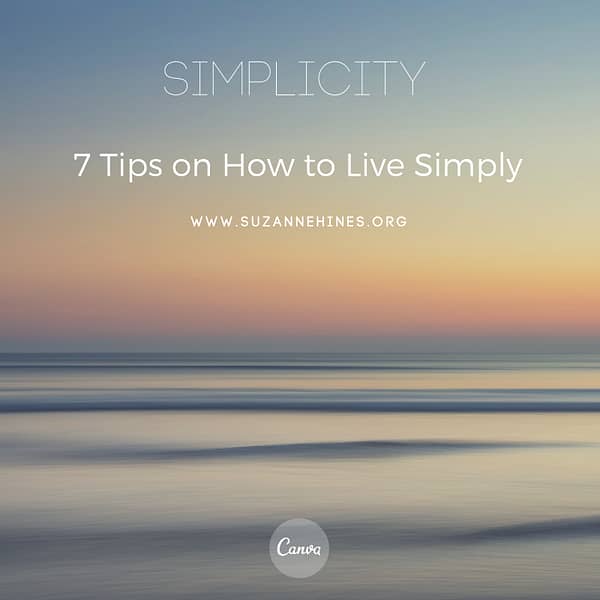Earlier this week, I published a post on our journey towards simplicity. At the beginning of our marriage, it was a complete necessity to live as simply as possible. Then, when we started bringing in a little more income it started to become more of a choice.
I also talked about the fact that we are not a minimalists, and we don’t plan to head that direction. But we are becoming “simplists” and we love it!
Over on Instagram, someone asked me for advice on how to start this journey, and I was a bit stumped on how to answer that. However, I have been thinking it over for days now, and I thought I would compile a little list here in this blog post. Remember, I am a beginner, too….I don’t have this all figured out. And every family will look so different in how they decide to pursue simplicity.
- Start with your calendar. This is potentially the hardest thing to simplify, because it seems like our weekly/monthly calendars fill up SO FAST! I don’t have any “rules” on how to keep my calendar clear, but I have found a lot of freedom in saying no this past year. While sometimes I mention how hard our law enforcement schedule can be, one of the things that really works well for us is Theo having Monday and Tuesday off. I tend to guard those days really closely. If there is a playdate or library event scheduled for that day, we don’t go..unless we are ALL going. If the calendar looks too full, I sometimes just ask myself, “what can I/should I get rid of?” and then I get rid of it.
- Revisit your budget. Living simply and budgeting often go hand in hand. Theo and I have found that our biggest temptation with our budget is to start with the full income amount and dole it out to all our different categories. So if we make $1000 a month and we have ten categories in our budget, each category gets $100. However, this doesn’t help with simplicity much because it makes me feel like I can and should spend all of it. Instead, it’s important to budget what we need and put the rest in a different fund. So, for example, if I only need $65 in groceries a month, budgeting $100 means I will just look for ways to spend more at the store. Instead, we budget $65 and can put the rest elsewhere. (Obviously those were made-up numbers).
- Set goals and priorities. As a family, determine what is most important to you. Do you LOVE watching Netflix and movies- more than getting out and going to the zoo? Or do you love traveling around to National Parks even more than driving a newer vehicle? Sometimes it’s all about prioritizing. As a family, we decided that we love going to the zoo…but we have always said we can’t afford a membership. Until we realized that cancelling Netflix would give us the same amount of money each year as buying a zoo membership. So we cancelled Netflix and got a zoo membership. The goal there wasn’t to save money, it was simply to evaluate our priorities and decide what we would prefer as a family. Do we value every family member having a separate bedroom, or would we rather just teach our kids to share space and have a bigger yard instead? Again, this is different for every family and that is why it’s so important to sit down as a family and decide what you prioritize.
- Choose contentment/mindset. So often we think that having “xyzzy” will make us happy. This can go both ways! We think that having more material possessions or a bigger house or a monthly massage will make us happy. But then we can swing the pendulum the other way and think that achieving minimalism will bring us the ultimate happiness. In the end, it’s really about choosing to find joy and fun and laughter, no matter the life circumstances. Again, this ties in with knowing our priorities. Theo and I would rather live in a shack with no electricity and be together than have a big house where everyone has their own bedroom. We don’t have some magical hearts who love each other unconditionally, because sometimes we do drive each other nuts and really, really, really want to have separate houses, never mind separate bedrooms. But it’s a choice. A mindset.
- Yes, you should probably get rid of some stuff. I’ve saved this point for last because I didn’t want to make the focus of simplicity on material possessions. It’s so much more than that. But, getting rid of material possessions really does help simplify life. It creates less visual clutter, it means that we are spending less time cleaning and organizing, it just simplifies EVERYTHING. It shows me what the difference is between a need and a want, and it just makes me feel more FREE in general. It doesn’t mean clearing your walls and painting them white, buying on Ikea shelf and decorating it with one plant and one book. It just means clearing your home of things that are absolutely not helpful or unnecessary. Again, this will be different for everyone. There have been a million blog posts and books written on this subject, so I won’t go into detail about that here. I have always used the “if I haven’t used it in a year, it’s leaving the house” rule, but when I recently purged a lot of our stuff I also asked myself another question. I asked myself “If I was moving overseas/across the country and only had limited suitcase space, would I want to take this item with me?”. It really changed my mindset because so often I think I’m attached to something but when I take it out of that exact context I couldn’t care less about the item.
- Simplicity starts from inside your home, not outside your home. One of the things that I see most often when people begin to pursue simplicity or minimalism is the temptation to start outside the home. We will jump on starting a “capsule wardrobe” by going shopping for 25 new items, when the closet at home is filled to the brim with clothing already! Or we will head to the container store to buy all kinds of organizational items when in reality we just need to sit down and starting purging linens from our linen cabinet. It is really tempting to go out and find all kinds of inspiration to simplify outside the home, but I assure that you buying things and bringing them into the home will only make the problem worse!
- No, this won’t bring you unending happiness. WHAT. A how-to post that ends without a pretty bow? Listen, I’m not going to tell you that simplifying your home will bring you ultimate happiness and your life will now be perfect. It won’t solve all your problems. You will probably still get sick. You will still argue and fight sometimes with your husband. You will still trip over things in your house. You will still have “bad days”. Even getting rid of most of your kids toys will not make them stop fighting (at least, it didn’t stop mine). However, I will say that simplifying can make things a bit easier. Instead of feeling ruled by our bank accounts and material possessions, I find us having more fun and just generally feeling more free.


I recently read a book called Rest: Living in Sabbath Simplicity by Keri Wyatt Kent. She argues that learning to keep the Sabbath is the first step in simplifying our lives. As we slow down and learn to focus on each other and on what’s important to us, then we simplify by focusing on those things. I think you’ve hit the nail on the head as you say essentially the same thing.